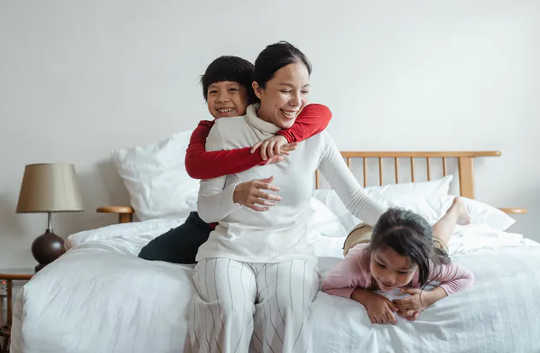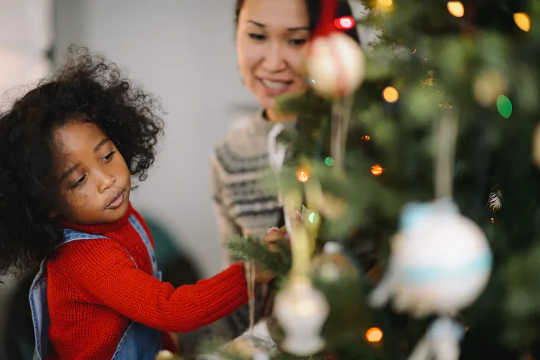The impact of lockdown has made many of us reflect on what’s important in our lives and in our personal relationships. For some, this has led to swapping life in the city for more space in the countryside. For others, lockdown restrictions have meant moving in together more quickly than might have been the case in ordinary circumstances.
For some couples, however, without the distraction of outside influences, there has been the dawning realisation they no longer want to remain together. This has led to increased numbers seeking legal advice about divorce – with family lawyers predicting a “post-lockdown divorce boom”.
For separating parents, a major question is how to maintain relationships and support children’s well-being during and after separation. My research in this area has found that children can come to view their parent’s separation positively, but that this very much depends on how parents handle and talk about the relationship breakup.
What helps
An assumption commonly made by parents is that their child is unaware of the situation because they have not spoken about it. But it’s surprising what young children overhear and the scenarios they create in their own minds
My research involved talking to young adults whose parents separated or divorced in childhood about their experiences. And their views provide valuable insights into how children experience and accommodate their parents’ separation.
I found that children come to view their parents’ separation positively when it brings parental conflict to an end. Good communication among all members of the family about what’s happening and the changes taking place, enables children to develop an understanding of the situation. This helps to support their adjustment over time .
Being able to maintain contact with both parents is very important for children. So having some form of contact arrangements in place as soon as possible (even if it needs refinement over time) will help to support children. Grandparents and other family members also provide an important role where children may feel unable to speak to their parents about the situation for fear of upsetting them.
Friendship groups are also important. Being able to maintain friendships by continuing to attend the same school and remaining in the local area is valued by children.
Plan now for Christmas
For separated parents, Christmas often prompts difficult discussions about where their child spends their time. And for those who have separated recently, it’s likely to be particularly challenging this year.
In normal times, where practical, many children will spend some time with each parent over the festive period, resulting in them having “two Christmasses”. This is often seen as a positive by children, but in the current circumstances this might not be an option.
It’s impossible to predict what restrictions may be in place by Christmas but it may be that family celebrations need to take a different form this year.

Divorce doesn’t have to mean unhappiness for children. Pexels.
At the start of the first lockdown in March, guidance was issued about children being able to move between their parent’s homes – such decisions need to take account of the child’s present health, the risk of infection and vulnerable people in one household or another. And this remains in place as we enter the second lockdown
Alternative arrangements might need to be put in place such as using Zoom, FaceTime, Whatsapp, Skype or the phone for celebrations. This will mean parents need to set aside their differences and focus on their children’s needs, to reach such arrangements.
This is particularly important given the disruption, fear and anxiety many children have faced during this pandemic. Using technology to stay connected and keep some of the family traditions alive requires a level of creativity. But this can be done – think film nights, reading stories each day, making Christmas cards or decorations (receiving craft items through the post is a welcome surprise for children), sharing recipes and food-tasting sessions, at home carol singing and taking time to develop new festive traditions.
Communication is key
Research shows that divorce doesn’t have to mean an unhappy childhood. Ultimately, if a child sees their parents communicate effectively, is able to meet up with both parents with ease and feels decisions are made that take their views into account, they feel they “matter” to their parents. They are reassured and have an increased sense of security.

Keeping family traditions alive will help children feel happy this Christmas. Shutterstock/Maksym Gorpenyuk
Of course, in the immediate aftermath of separation, it takes a while for arrangements to be put in place and for parents and children to adjust to the changed situation. But over time, where these factors are in place, children are likely to accommodate their parents’ separation well.
This year the question facing everyone is what small things can be put in place to ensure that Christmas remains a special and joyous occasion for children. Being creative about how we stay connected is likely to be the answer.![]()
About the Author
Susan Kay-Flowers, Senior Lecturer in Education and Childhood Studies, Liverpool John Moores University
This article is republished from The Conversation under a Creative Commons license. Read the original article.

Related Books:
The Five Love Languages: The Secret to Love That Lasts
by Gary Chapman
This book explores the concept of "love languages," or the ways in which individuals give and receive love, and offers advice for building strong relationships based on mutual understanding and respect.
Click for more info or to order
The Seven Principles for Making Marriage Work: A Practical Guide from the Country's Foremost Relationship Expert
by John M. Gottman and Nan Silver
The authors, leading relationship experts, offer advice for building a successful marriage based on research and practice, including tips for communication, conflict resolution, and emotional connection.
Click for more info or to order
Come as You Are: The Surprising New Science that Will Transform Your Sex Life
by Emily Nagoski
This book explores the science of sexual desire and offers insights and strategies for enhancing sexual pleasure and connection in relationships.
Click for more info or to order
Attached: The New Science of Adult Attachment and How It Can Help You Find—and Keep—Love
by Amir Levine and Rachel Heller
This book explores the science of adult attachment and offers insights and strategies for building healthy and fulfilling relationships.
Click for more info or to order
The Relationship Cure: A 5 Step Guide to Strengthening Your Marriage, Family, and Friendships
by John M. Gottman
The author, a leading relationship expert, offers a 5-step guide for building stronger and more meaningful relationships with loved ones, based on principles of emotional connection and empathy.


























